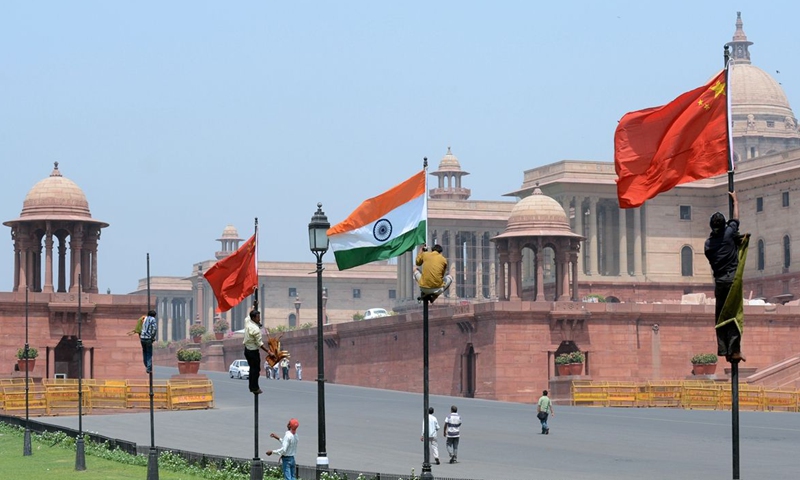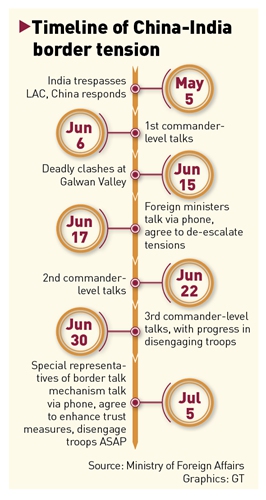China, India reach border consensus
Troop withdrawal details kept mum to avoid speculations

Photo:AFP
The Chinese Special Representative of the China-India Boundary Question, State Councilor and Foreign Minister Wang Yi and Indian National Security Advisor Ajit Doval spoke Sunday night, and the two sides reached a consensus on de-escalating border tensions. Experts said that such high-level talks send positive signals on easing border tensions.
The Chinese Foreign Ministry released the contents of the conversation on Monday, which showed that the two sides reached a consensus on four aspects. One is that they agreed to take guidance from the important consensus previously reached by the top leaders, which attaches great importance to the stability of the border areas with the development of bilateral ties, and put border disputes in a proper perspective to avoid escalating the disputes.
Both sides welcomed the progress achieved in the recent military and diplomatic meetings, agreed to stay in dialogue and consultation, and stressed the importance to act on the consensus reached in the commander-level talks between bilateral border troops, to complete disengagement of the front-line troops as soon as possible, according to the FM release.
In response to a question on whether China has withdrawn troops from the Galwan Valley, Foreign Ministry Spokesperson Zhao Lijian said at Monday's press briefing that the two sides have agreed on disengagements of frontline soldiers. "We hope the two sides could meet each other halfway in implementing these agreements," Zhao said.
The current diplomatic and military talks between China and India aim to prevent the situation from deteriorating, and it is a consensus reached by the two sides to defuse the tensions, Qian Feng, director of the research department of the National Strategy Institute at Tsinghua University in Beijing, told the Global Times.
"Meetings of China-India Special Representatives are one of the top political measures to handle the border issues, only second to the summit of leaders from the two countries, and it is safe to say that the special representative agreements send a positive signal to ease border tensions," Zhao Gancheng, director of the Center for Asia-Pacific Studies at the Shanghai Institute for International Studies, told the Global Times on Monday.
Hu Zhiyong, a research fellow at the Institute of International Relations of the Shanghai Academy of Social Sciences, said the agreements eased border tensions.
The details of agreements implementation, such as who withdraws soldiers first from the border area, may be carried out in a "silent" fashion, to avoid further stirring public opinion or provoking irrational sentiments, especially in India, Zhao Gancheng noted.
The two sides also agreed to enhance communication between special representatives on border issues, to strengthen trust and to avoid incidents that may affect border stability from happening again, the FM said.

Graphics: GT
During talks with Doval, Wang said that what happened in the Galwan Valley is very clear, and China will continue to safeguard its sovereignty to maintain peace and stability of the border areas.
Wang said China hopes India would work with China toward the same goal and properly guide public opinion, safeguard and push the normal communication between the two countries.
Qian said that considering the current situation, no move should be made to stir resentment among the peoples of China and India.
Anti-China sentiments flooded India in recent weeks, with some nationalists calling on a ban of Chinese products and even war. Indian media reported the Indian military was enhancing air-defense deployment along its border areas.
Chinese experts warned that the Indian government should not be abducted by extreme nationalism or do things that will jeopardize China-India ties.




